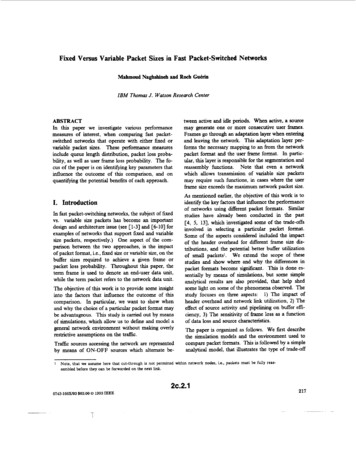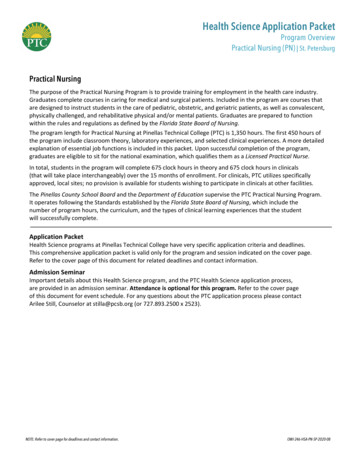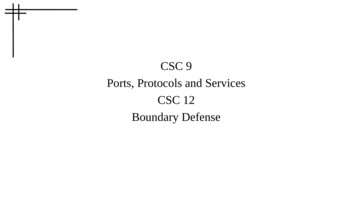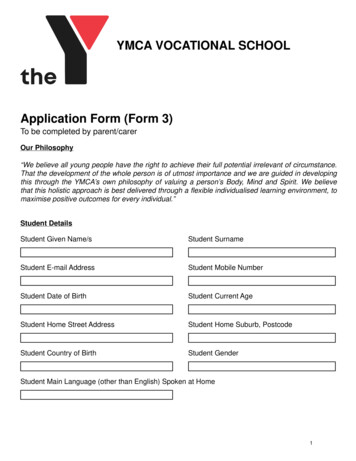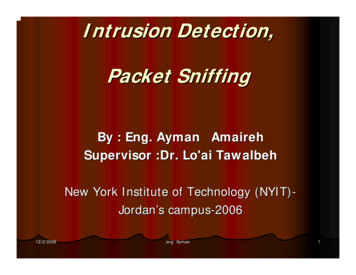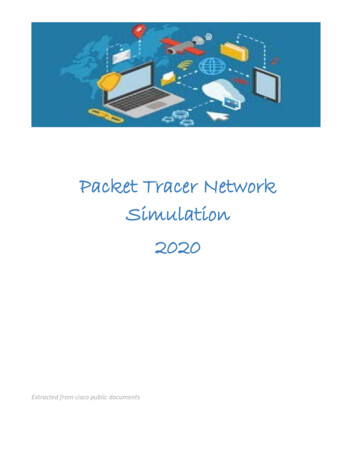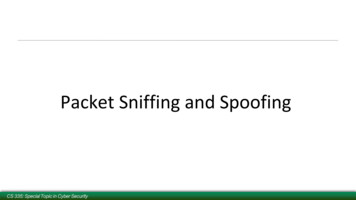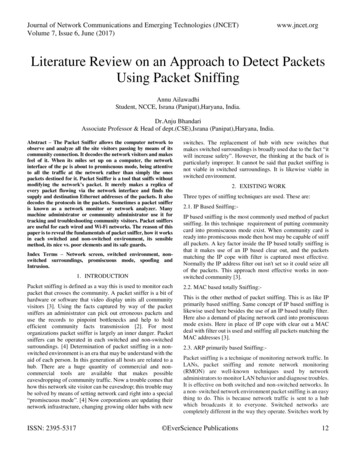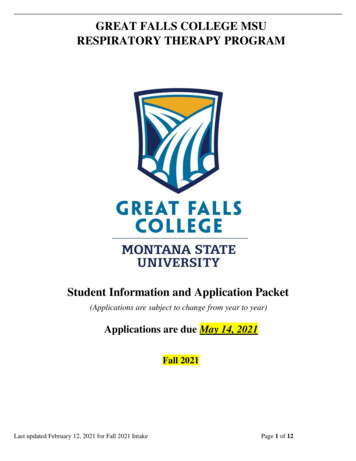
Transcription
GREAT FALLS COLLEGE MSURESPIRATORY THERAPY PROGRAMStudent Information and Application Packet(Applications are subject to change from year to year)Applications are due May 14, 2021Fall 2021Last updated February 12, 2021 for Fall 2021 IntakePage 1 of 12
Respiratory Therapy Program Student Information and Application PacketDear Prospective Respiratory Therapy Student:Thank you for your interest in the Great Falls College Montana State University Respiratory Therapy Program.You can make a lifelong career as a Respiratory Therapist. The job market and opportunities for RTs has neverbeen better. You have picked a great time to advance your career as a healthcare professional in the field ofRespiratory Therapy.As a Respiratory Therapist, you will care for patients with diseases of the lungs and heart. They will range in agefrom premature infants to the elderly. You will have the opportunity to work in all areas of the hospital and willbe a vital part of the lifesaving emergency response team. While most Respiratory Therapists work in acute carehospitals, a substantial number are employed in alternative care sites, such as nursing homes, physicians’ offices,home health agencies, specialized care hospitals, sleep labs and medical equipment supply companies.The Great Falls College Respiratory Therapy Program accepts twenty-five students each year over several clinicalsites. The small size creates the opportunity for faculty and preceptors to pay individual attention to each student.This class size is determined by available clinical opportunities. Limited enrollment creates a competitive studentselection process. It is important for you to review and understand this process. Please refer to the ApplicationEvaluation (page 14-15) located in this information packet.Information about the program and application materials for the fall entry are enclosed. Please read these materialscarefully.For additional information or answers to specific questions, please contact the Health Science ProgramAssistant at 771-4350 or Brian Cayko, Program Faculty, at 771-4359.Thank you for your interest in the Great Falls College Respiratory Therapy Program. Sincerely,Brian Cayko, MBA, RRT, FAARCDirector of Clinical EducationLast updated February 12, 2021 for Fall 2021 IntakeLeonard Bates, ME, RRTRespiratory Therapy Program DirectorPage 2 of 16
TABLE OF CONTENTSLetter from the Program Director .2The Respiratory Therapy Program .4 Occupational OutlookEducational ProgramProgram ExpensesAdmission & Eligibility to Great Falls College MSU .5 Equal OpportunityStudent Health InsuranceNotification of AcceptanceStudent Background ChecksProgram Admission Process . . Application ScoringThe Respiratory Therapy Curriculum 67Prerequisite coursesPrerequisite CourseworkProgram Coursework Application Packet Cover Sheet .89Technical Standards Form . . . 10-11Distance Program Agreement 12-13Application Evaluation Form 14-15Healthcare Employment Verification Form .Last updated February 12, 2021 for Fall 2021 IntakePage 3 of 1616
Great Falls College MSU Associate of Applied Science Degree Respiratory TherapyProgram Description and Occupational Outlook:The Respiratory Therapist functions as an integral member of the medical team working closely with Doctors, Surgeons,Anesthesiologists, Registered Nurses, and other medical personnel. Some of the responsibilities include life support,mechanical ventilation, code response team, intubations, arterial blood gasses, neonatal intensive care, pediatrics, pulmonaryfunction, sleep disorders, aerosol and oxygen therapy. Patient diseases like COPD, Asthma, Lung Cancer, Cystic Fibrosis,Respiratory Distress Syndrome and Pulmonary Fibrosis are just a few of the pathologies RTs treat. During the Covid-19pandemic of 2019-2021 Respiratory Therapists were acknowledged as mandatory front line experts working to treat and savelives of the patients contracting this virus.According to the Bureau of Labor Statistics (https://www.bls.gov/) employment of is expected to grow 19% between 2019 and2029, much faster than the average for all occupations, as the population ages and lung disease patient cases increase.In Montana, the median hourly pay for a respiratory therapist is approximately 28 per hour. The following wage informationfor Montana is according to the Bureau of Labor Statistics and the Montana Department of Labor & Industry.Median Wage: 28.09 per hour / 58,420 yearlyExpected Mt growth: 30% increaseThere is also opportunity to earn additional hourly pay with on-call schedules, overtime, shift differentials for nights &weekends and holiday pay. A Respiratory Therapist works in all areas of healthcare including contracts as a ‘traveler’ thatworks short term contracts all over the country for premium pay and with your lodging expenses paid for.Educational Program:The Respiratory Therapy program is accredited by the Commission on Accreditation for Respiratory Care. Graduates ofthis program are eligible to take the National Board for Respiratory Care’s Certification and the Registered RespiratoryTherapist Examination.After completion of prerequisite coursework, the Respiratory Therapy program is four consecutive semesters. The programis competency-based and has the goal of preparing graduates with the knowledge, skills, and values to work as aRespiratory Therapist.This program utilizes distance (remote) online classroom learning as well as clinical laboratory and patient care practice. Itis rigorous, fast-paced and challenging. There are many tests, quizzes, assignments, experiences and competencies.Students find it necessary to spend substantial study time outside of the online classroom, lab and clinic environments.Generally, for every credit hour, you will spend at least 4 hours in preparation &/or in the completion of assignments. Forexample, in a 3 credit course you should expect to devote 12 hours per week working on course material. Clinical coursetime, i.e. time spent at the training hospital, will vary from semester to semester but in general you should expect 8 hourclinical days several days a week that can range anywhere from 6 a.m. to 10:30 p.m. and on occasion an overnight shift.Program Expenses:Respiratory Therapy Students are required to purchase personal equipment and supplies, textbooks, online access to coursematerial and other required online access programs required for course completion and clinical record keeping, uniforms,lab fees, and transportation to clinical sites are all the students responsibility to provide. Students should begin planningearly for financial aid to meet their educational expenses. Approximate program costs can be found in the current catalogonline at tory-care/#estimatedcosttextLast updated February 12, 2021 for Fall 2021 IntakePage 4 of 16
Admission to the Great Falls College MSUStudents must be admitted to the College and in good academic standing prior to the submission of the RespiratoryTherapy Program Application. Applications will not be reviewed until applicants have been admitted to Great Falls CollegeMSU and official transcripts have been reviewed by the Registrar.Acceptance to Great Falls College MSU requires a completed admissions application file, which may be obtained byvisiting the campus, calling the College (406) 268-3700 or applying online at: http://admissions.gfcmsu.edu/apply.htmlEligibility for Admission into the Respiratory Therapy ProgramAll eligibility forms and documents are enclosed in the Respiratory Therapy Program Information and Application Packet.To be eligible to apply for admission into the Respiratory Therapy Program, applicants must: Be admitted to Great Falls College MSU and currently in good academic standing Completed all prerequisite course work with a minimum grade of “C-” in each course and a minimum cumulativeGPA in prerequisite course work of 2.0. Prerequisite coursework can be taken at other accredited institutions but it is the applicant’s responsibility toconfirm those courses are equivalent to the program’s prerequisites and are transferable to this institution.Equal Opportunity PolicyGreat Falls College MSU is committed to the provision of equal opportunity for education, employment, and participation inall College programs and activities without regard to race, color, religion, national origin, creed, service in the uniformedservices (as defined in state and federal law), veteran status, gender, age, political ideas, marital or family status, physical ormental disability, genetic information, gender identity, gender expression, or sexual orientation. The College's EqualOpportunity Officer is the Chief Student Affairs & Human Resources Officer, 2100 16th Avenue South, Great Falls, MT59405. Telephone: 406-771-4300Student Health InsuranceProgram students entering the clinic setting are strongly advised to carry their own medical health insurance. Students will befinancially responsible for their health care if they become ill or injured in the clinical setting.Student Health Insurance Option (Subject to change)All GFC MSU students enrolled for 6 or more credits are required to have health insurance. For students without coverage,GFC MSU offers a program developed especially for students by Blue Cross/Blue Shield of Montana. This plan providescoverage for injuries and illnesses on or off campus. Please contact Student Central 406-771-4324 for more information.Please see http://students.gfcmsu.edu/insurance.html for more information.Notification of AcceptanceStudents will be notified of acceptance into the Program by June 21, 2021. Accepted students will be required to provideproof of Healthcare Provider CPR certification and immunizations at the beginning of the fall semester. You are alsorequired to use the GFC MSU Background and Drug Screen service provider to provide these two items. A full list of theserequirements can be found at http://www.edu/webs/respiratorycare/index.html and clicking on “Steps to Apply.”Accepted students must attend the Respiratory Therapy program orientation and Health Science division orientation. Bothare mandatory and available online. These will be due during the week prior to the start of fall classes and times will besent to you in your acceptance letter.Health Sciences Division Policy: Student Background Checks To promote patient safety and decrease institutional liability, most clinical agencies require students to havecleared a background check and drug screening before they will permit the students in the lab and clinical setting.To meet these requirements, the College requires that the check/screening be done prior to placement in anyclinical agency.Last updated February 12, 2021 for Fall 2021 IntakePage 5 of 16
Background checks/drug screenings are done at the student’s expense. Students with background checks thatreveal a finding will be evaluated individually to determine whether they will be eligible for clinical placementand state licensure for their respective degree program.Information about how to obtain the appropriate background check and drug testing is provided in the acceptanceletter.Program Admission ProcessThe Respiratory Therapy Program Admissions Committee reviews application packets and uses established admissionscriteria to rank applicants for admission. The Application Evaluation form (page 14-15) used by the committee is enclosed.Criteria for selection emphasize academic performance in prerequisite course work and previous education.The priority deadline for applications to the Respiratory Therapy Program is May 14, 2021.Completed Program Application Packets may be hand delivered to Health Science Program Assistant atthe College or mailed to the College.Contact InformationMailing address:Health Science Program AssistantRespiratory Therapy Admissions CommitteeRoom R 227Attention: Respiratory Therapy Program406.771.4350Great Falls College MSU2100 16th Avenue SouthGreat Falls, MT 59405 Please send all application items as a completed packet. Items sent separately and at random are easily lost or misfiled.We are not responsible for any late, lost or misfiled information. Please only send required documentation as othersupplemental items will be discarded. Priority Application Due Date: May 14, 2021 It is the applicant’s responsibility to ensure that all requirements are met by the established deadline. Deadlines,guidelines, and policies apply equally to all students; thus, there can be no exceptions. Great Falls College MSU’s Respiratory Therapy Program does not maintain a waiting list. Applicants must reapplyeach year.APPLICATION SCORING: For applicants, who have taken courses multiple times; the most recent verifiable grade will be used for scoring /GPAcalculations. Points and GPAs will be calculated by the Registrar’s Office and grade points will be calculated using the currentcatalog criteria, which includes /- weighing. Plus or minus is equivalent to the following:(A) (A-) 43.7(B ) 3.3(C ) 2.3(B) 3(C ) 2(B-) 2.7(C-) 1.7For students, who have been awarded credit for successful performance in subject examinations of the CLEP or DSSTprograms, the credits will be accepted, however there is no grade for calculation for scoring or GPA. In this situation, thetotal points will convert to percentages for ranking.For students, who have been awarded credit for successful performance in subject examinations of the AP program, thecredits will be accepted for scores of 3, 4 or 5, however there is no grade for calculation for scoring or GPA. In thissituation, the total points will convert to percentages for ranking.For students, who have been awarded credit for Prior Learning Assessment, the credits will be accepted for Passing (P)grades, however there is no grade for calculation for scoring or GPA. In this situation, the total points will convert topercentages for ranking.For students, who have additional educational attainment, the Registrar’s Office will verify degrees awarded fromofficial transcripts.Last updated February 12, 2021 for Fall 2021 IntakePage 6 of 16
Respiratory Therapy CurriculumPrerequisite coursesA background in related instruction and basic science is essential to succeed in the Respiratory Therapy program.The following courses must be completed or be in progress prior to admission into the Respiratory Therapy Program.Grades in prerequisite courses are a major factor in ranking applications for admissions. These courses must be completed with a “C-” or better before official acceptance into the Respiratory Therapy Program. Recommended Prerequisite course, not requiredCourse #Course TitleCreditsBIOM 250Microbiology for Hlth Sci w/ Lab Basic4AHMS 144Medical Terminology3CHMY 121Intro to General Chemistry with lab4Science courses must be completed within five (5) years of and other courses must be completed within 15 years ofapplying to the Respiratory Therapy Program.Transferable CoursesGeneral education coursework taken at other accredited education institutions may be designated as equivalent coursesfor Great Falls College MSU. For a current listing of approved equivalent courses, visit the Transfer Guide under StudentInformation at r.p selstate Transfer work must be from regionallyaccredited institutions.The transferring student must initiate the request for evaluation of credit during the admission process by furnishing anofficial transcript from the transferring institution(s) and the necessary materials, including copies of the appropriatecatalog descriptions or course syllabi, to Registrar. Official transcripts must be sent directly by the issuing institution tothe following address:Registrar’s OfficeGreat Falls College MSU2100 16th Ave SGreat Falls, MT 59405Page 7 of 16Last updated February 12, 2021 for Fall 2021 Intake
Respiratory Therapy Program CoursesStudents must earn a minimum grade of “C-” in all required courses to continue in the program.Page 8 of 16Last updated February 12, 2021 for Fall 2021 Intake
GREAT FALLS COLLEGE MSURESPIRATORY THERAPY PROGRAM(This & all of the following sheets must be turned in completed & together.)APPLICATION PACKET COVER & CHECK-OFF SHEETNAMEADDRESSCITYSTATETELEPHONE (Home)ZIP(Other)E-Mail ADDRESSGFC MSU STUDENT IDENTIFICATION NUMBER:Check-off List ItemCompleted Admissions File. A completed admissions file includes a completed application, copies of highschool/GED/HiSET transcripts or diplomas, proof of 2 MMRs, and completion of placement testing or submit officialcollege transcript(s) verifying placement. Complete admissions files will be verified by the Registrar’s Office andapplicants with incomplete files will not be admitted to the program. Students are encouraged to check with theAdmissions Office to confirm that their admissions file is complete.In Good Academic Standing All students must be in good academic standing which means they are not on academicprobation OR academic probation continued, OR academic suspension. Good academic standing will be verified bythe registrar and any applicants who are not in good academic standing will not be admitted to the program.Students are encouraged to check with the Registrar’s or Admissions Office to confirm that they are in goodacademic standing.Application Packet Cover & Check-off sheet [this page,9)]Signed Technical Standards Form (page 10 & 11)Signed Distance Expectancy Form (page 12 & 13)Application Evaluation (page 14-15)Official Transcripts for all completed post-secondary education and prerequisite coursescompleted at another institution – By May 14, 2021(Send transcripts to Registrar- No need to include in packet)Important Note:The program specific professional organization may not allow you to take the national exam following the completion of thisprogram. Acceptance for taking national exams or granting of a state license, if you have a felony conviction, is approved ordenied by the professional organization or the state board on an individual basis. If you have a felony conviction, contact theappropriate organization for further information before making an application to the program.Respiratory Therapy:National Board for Respiratory Care http://www.nbrc.org/ andMontana Respiratory Care Practitioner Board http://boards.bsd.dli.mt.gov/rcpPage 9 of 16Last updated February 12, 2021 for Fall 2021 Intake
Technical Standards for Respiratory Therapy Program (page 1 of 2)The following statements are given to provide the student with a description of the type of physical/technical standardsnecessary to complete the Respiratory Therapy Program. These standards are not measured as a requirement for Programadmission. However, the student is encouraged to consider the physical and mental requirements of the Program and tomake an appointment with the Program Director to discuss concerns or requests for accommodation for his/her disability.Students with documented needs for accommodations are to meet with Great Falls College MSU’s Disability Servicesoffice.In order to successfully complete the Respiratory Therapy Program, students must demonstrate their competency incarrying out tasks necessary for safe and effective practice in the field including routine part of the classroom, laboratory,or clinical education.Observation/Sensory-Motor Accurately identify and assess heart, breath, abdominal, and other sounds of the human body & use of stethoscope Accurately assess normal and abnormal color changes in the skin and observe pupil changes Accurately differentiate colors and recognize patient odors including color codes on supplies, medications, and equipment.Detect and respond appropriately to activation/warning signals on equipment) including auditory and visual signals)Detect significant environmental odors, distinguish fine print on various medication labelsObserve and assess conditions of a patient accurately, at a distance and close at hand, and observe non-verbalcommunication when performing assessments and interventions or administering medicationsObserve and participate in all demonstrations and experiments in the basic sciences including computer-assistedinstruction. Observe digital or waveform readingsPerceive signs of disease and/or infection as manifested through physical examination including visual images of thebody surfaces, palpable changes in various organs and tissues, and auditory information (patient voice, heart sounds,bowel and lung sounds). Read gradients/calibrations on a syringeCommunication Accurately document treatment information Communicate accurately and effectively in English with other students, faculty, staff, patients, families and otherprofessionals in a culturally sensitive manner Communicate effectively in classroom presentations, seminars, simulation, practicum sites, practicum conferences, andonline-formats Convey or exchange accurate information in a clear and efficient manner to obtain a health history, identify problemspresented, and explain alternative solutions Effectively communicate with and respond appropriately to other healthcare professionals’ questions, requests, anddirections in classroom, lab and clinical settings Process and communication information on the patient’s status including changes in mood, activity and posture, andnon-verbal communications with accuracy in a timely manner to members of the health care teamPsychomotor Adjust and operate diagnostic or therapeutic devices by manipulating knobs, dials, and keyboards Answer patient call lights or intercom system to determine patient needs. Assemble medical equipment and supplies Conduct laboratory and diagnostic tests and carry out physical assessments Coordinate fine and gross muscular movements to treat patients in emergency situations Accurately manipulate fine objects such as needles, syringes, and other fine medical instruments. Engage in patient care delivery in all settings and deliver care to all patient populations including but not limited tochildren, adolescents, adults, individuals with disabilities, medically compromised patients and vulnerable adults Execute physical movements required to provide general care and treatment to all patients in all health care settingsfrom a variety of positions such as standing, sitting, bending, or stooping. Perform a variety of tasks at varyingheights requiring physical agility. Maintain balance in multiple positions. Move within confined spaces.Page 10 of 16Last updated February 12, 2021 for Fall 2021 Intake
Correctly perform aseptic procedures such as disinfection of medical equipment, sterilization of medical instruments,management of sharps, and maintenance of proper protocols for management of bloodborne pathogens.Accurately palpate patient to determine differences in sizes and shapes, detect veins and arteries, and identify andpalpate body landmarks.Accurately perform chart reviews and continuous assessment of patient’s status using available technology.Move and position heavy and/or large equipmentOperate equipment typically found in the health care environment including Ventilators, Oxygen equipment, IV pumps,cardiac monitors, humidifiers and electric and manual blood pressure equipment, safe handling equipmentPerform basic life support, ventilation/compression (including CPR and AED), and other basic life support functionsPerform inspection, palpation, auscultation, percussion, and other diagnostic maneuversPerform or assist with procedures, treatments, and medication administrationRespond to emergencies precisely, consistently, accurately, and quicklySafely assist a patient transfer. Ex. from bed to chair, bed to stretcher, chair to bed as neededTransport patients in wheelchairs as necessary. Turn/reposition bedfast patientIntellectual-Conceptual, Integrative, and Quantitative Accurately perform mathematical calculations and calculate medication dosages & IV rates from instructions given Analyze, collect, and synthesize data to reach diagnostic and therapeutic judgments and to develop an appropriateplan of care. Demonstrate factual, conceptual, procedural, and metacognitive knowledge Effectively perform chart reviews and continuous assessment of the patient’s status Effectively prioritize multiple tasks. Effectively take and record doctors’ orders, patient histories, and subjective/objective findings Exercise good judgment in patient assessment. Maintain accurate clinical records on patient care Manage the demands of time constraints and frequent interruptions Measure, calculate, reason, analyze, integrate, synthesize and problem solve in the context of the level and the focusof their curricular program. Perform data entry tasks using available technology. Perform universal precautions against contamination Provide all aspects of patient care including medication administration and treatments according to nursing unitguidelines Provide clear expression of personal ideas and feelings, demonstrations of bidirectional feedback, and sensitivity topersons with ideas and experiences that different from their own. Provide in-depth rationale for plan of care Use and interpret information from assessment techniques/maneuvers such as those involved in assessing respiratoryand cardiac function, blood pressure, blood sugar, neurological status, etc. Use and interpret information related to physiologic phenomena generated from diagnostic tools(sphygmomanometer, otoscope, ophthalmoscope) during a comprehensive examination of a patientBehavioral and Social Attributes Abide by the professional standards of practice defined by the discipline Demonstrate compassion, sensitivity, and concern for others Demonstrate understanding and adherence to professional standards of nursing Function effectively under physically taxing workloads including in times of physical and mental stress Function effectively under stress and to adapt to an environment that may change rapidly without warning and/or inunpredictable ways Maintain appropriate professional decorum in high stress situations and when exposed to unusual sights and smells Maintain confidentiality with regard to all phases of workI have read the above requirements and understand that my inability to comply with these may result in my failure tosuccessfully complete the program I have chosen.SignatureDate:Page 11 of 16Last updated February 12, 2021 for Fall 2021 Intake
Associate of Applied Science Respiratory Therapy Distance Program Agreement(Page 1 of 2)Distance or hybrid learning is used at Great Falls College MSU in the Respiratory Therapy Program. In thisdelivery method, there is a combination of online learning activities where one or more types of technologies areused to deliver instruction to students who are separated from the instructor in space and time. All “traditional” types of course content including lectures, quizzes and exams will be available inmodule style content online asynchronously. You are required to work through this materialaccording to the course schedule but it is available to you 24/7. This is designed to allow flexibilityin your learning time yet hold you accountable for consuming the content and doing the work.You will be required to attend weekly live online sessions with your faculty and other students.These live sessions will be “zoom” type of meetings and will be used as Q&A’s, content review,program updates & reminders as necessary. The actual times of these sessions will vary.Clinical and laboratory attendance is required according to the schedule setup by the Director ofClinical Education, program faculty and your local clinical site. The days, hours and locations ofthese sessions will vary but an advance schedule will be provided to allow you to plan accordingly.Full details of clinical and lab sessions will be provided once you are in the program but in generalyou should expect to be in a lab session at your local clinic around 3 hours per week and in aclinical session 2-3 days a week with varying times. Labs begin the first semester and Clinical thesecond semester.The Local (clinical component) and Online (classwork components) of this program allow for youto become a Respiratory Therapist where you live and offers flexibility in learning times toaccommodate busy lives. However, this type of learning requires a great level of self-control,motivation and dedication to your studies and your schedule. Make no mistake, this is a FULLTIME commitment and you should expect to spend at minimum 40 hours per week working oncoursework and clinical sessions and in most cases more.Distance Education in respiratory therapy can be a daunting undertaking and we want you to besuccessful in your endeavors here with Great Falls College MSU. In addition to the amount of timeyou are investing, participating in this distance program means that you also have to take theinitiative to establish connections with the community for your clinical locations. You must be ableto be resilient in an environment that requires you to self-advocate, be vocal about your needs, andto be self-motivated to arrange what you need to succeed.(Continued on next page .)Page 12 of 16Last updated February 12, 2021 for Fall 2021 Intake
Associate of Applied Science Respiratory Therapy Distance Program Agreement(Page 2 of 2)The face-to-face component of the program is utilized for the lab and clinical courses, where the students must bein a clinical facility with an identified preceptor. Additionally, due to the distance nature of the program, reliableand high quality technology and computer competency is necessary. Students in this program
Respiratory Therapy Program Student Information and Application Packet Dear Prospective Respiratory Therapy Student: Thank you for your interest in the Great Falls College Montana State University Respiratory Therapy Program. You can make a lifelong career as a Respiratory Therapist. The job market and opportunities for RTs has never been better.
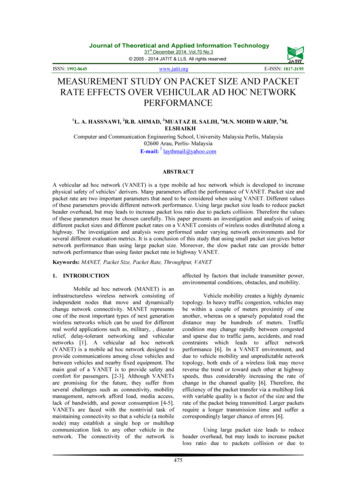

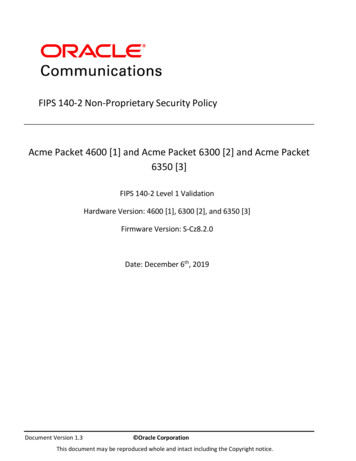
![FIPS 140-2 Non-Proprietary Security Policy Acme Packet 1100 [1] and .](/img/49/140sp3490-5601486.jpg)
